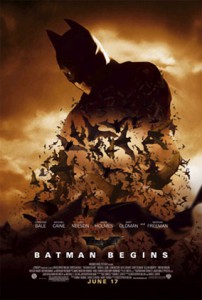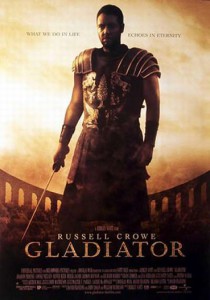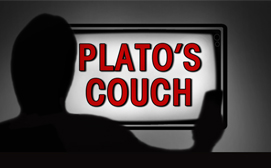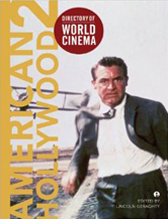
FEATURE: Looking Forward to the Past
Ever since George Lucas decided it’d be a good idea to take us back to a ‘longer time ago’ in a galaxy ‘further away’, Hollywood has been increasingly overcome with prequel fever. Yes, barely a moment had passed since our realisation that Darth Vader was an annoying adolescent with poor acting skills that we noticed Harry and Lloyd’s teenage years were best forgotten (Dumb & Dumberer), Aliens and Predators were a confused bunch until Ripley and Dutch appeared on their turf (AVP), and Hannibal looked much older before Clarice and her screaming lambs (Red Dragon).
 Now, more than ever when it comes to cinema, ‘origins’ rather than ‘originality’ seems to be the order of the day. We’ve had two Exorcist prequels (Dominion and The Beginning), a Romy and Michele flashback, ventured to The Scorpion King’s younger days, seen Batman Begins, and Hannibal Rising, got A New Beginning from The Texas Chainsaw Massacre and ended up in Casino Royale. Even most of the sequels these days end up looking more like prequels. Take Superman Returns and Rocky Balboa, the narratives of both go back to the past in order to explain the beginnings of their respective heroes. One thing’s for certain in all of this, Hollywood’s ‘prequelibrium’ is not ending anytime soon; Halloween, Friday the 13th and Star Trek all have ‘origin’ productions in the pipeline.
Now, more than ever when it comes to cinema, ‘origins’ rather than ‘originality’ seems to be the order of the day. We’ve had two Exorcist prequels (Dominion and The Beginning), a Romy and Michele flashback, ventured to The Scorpion King’s younger days, seen Batman Begins, and Hannibal Rising, got A New Beginning from The Texas Chainsaw Massacre and ended up in Casino Royale. Even most of the sequels these days end up looking more like prequels. Take Superman Returns and Rocky Balboa, the narratives of both go back to the past in order to explain the beginnings of their respective heroes. One thing’s for certain in all of this, Hollywood’s ‘prequelibrium’ is not ending anytime soon; Halloween, Friday the 13th and Star Trek all have ‘origin’ productions in the pipeline.
So what, if anything, does this trend suggest? Most obviously there is the financial opportunity afforded by prequels, re-enlivening tired franchises worn out by an endless repetition of formulaic narratives. Going back to the beginning allows studios to recast the mould and begin over again. Admittedly, in some cases this produces interesting results. Christopher Nolan’s addition to the Batman franchise gave the ‘Dark Knight’ the complex screen treatment that’s been sadly lacking since Burton gave up at the helm. If nothing else it certainly helped erase memories of Batman And Robin – for that alone I’m truly grateful. Alas, such interesting revisions seem to be in the prequel minority thus far.
 There is however, another underlying compulsion that I believe is being played out in the current prequel trend. It suggests to me not just a carefully orchestrated financial ploy, but rather a sign of some search for the ‘truth’ that can only be found by going back into history. In spite of the fact that most prequel genres are hardly those of ‘high art’ – horror, sci-fi, action – the kind of reversions offered by these films need not be taken in isolation. Since the turn of the century, Hollywood has seemingly rediscovered its passion for both the historical epic; (Gladiator, Alexander, Kingdom of Heaven, King Arthur, Troy, 300) and the WWII film; (Saving Private Ryan, The Thin Red Line, Pearl Harbour, Hart’s War, Flags Of Our Fathers). For me these parallel trends are symptoms of the same desire, an impulse to retreat into the past as a way of confirming the direction of the future. Most often, these films seek to reaffirm certain moral values, or cultural traditions deemed lost or abandoned upon the postmodern information superhighway.
There is however, another underlying compulsion that I believe is being played out in the current prequel trend. It suggests to me not just a carefully orchestrated financial ploy, but rather a sign of some search for the ‘truth’ that can only be found by going back into history. In spite of the fact that most prequel genres are hardly those of ‘high art’ – horror, sci-fi, action – the kind of reversions offered by these films need not be taken in isolation. Since the turn of the century, Hollywood has seemingly rediscovered its passion for both the historical epic; (Gladiator, Alexander, Kingdom of Heaven, King Arthur, Troy, 300) and the WWII film; (Saving Private Ryan, The Thin Red Line, Pearl Harbour, Hart’s War, Flags Of Our Fathers). For me these parallel trends are symptoms of the same desire, an impulse to retreat into the past as a way of confirming the direction of the future. Most often, these films seek to reaffirm certain moral values, or cultural traditions deemed lost or abandoned upon the postmodern information superhighway.
It is perhaps no coincidence then that these trends have intensified in the wake of 9/11 and the subsequent global crusade against ‘terrorism’. For what better way to flee the uncertainty of our current times then by taking up refuge in a fondly remembered past, where heroic deeds ruled, men were ‘men’, and goodness always prevailed? In their melancholic nostalgia the prequels and historical revisionist epics are visible symptoms of a culture caught in the throes of post-traumatic anxiety. As a form of therapeutic escape fantasy, ‘going back’ also provides a template for a secure vision of the future. Once need only recall the ‘time-travel’ narratives of the 1980s (eg. Back to the Future), where reversing to a simpler and more morally stable era can help right the wrongs of the present. One question that begs asking in all of this though, is whose interests are being served by such flights into the past? As Hollywood has so far demonstrated, celluloid history is inhabited and (re)written by those with the greatest access to power, and not surprisingly, those with the most to lose from present uncertainties; white, Western males. Perhaps it’s time we again start looking to the future.
2 Responses to “FEATURE: Looking Forward to the Past”
RSS feed for comments on this post. TrackBack URI





Hello, Are you going to be writing a follow-up piece? My husband and me have taken some time searching over your blog and funnily enough you highlighted one thing I was referring to only the other day
I am certainly tempted to write a follow-up piece – maybe at the end of the year. If anything, the trend of ‘origin’ narratives that I discuss here has only strengthened since the time of this post’s publication.